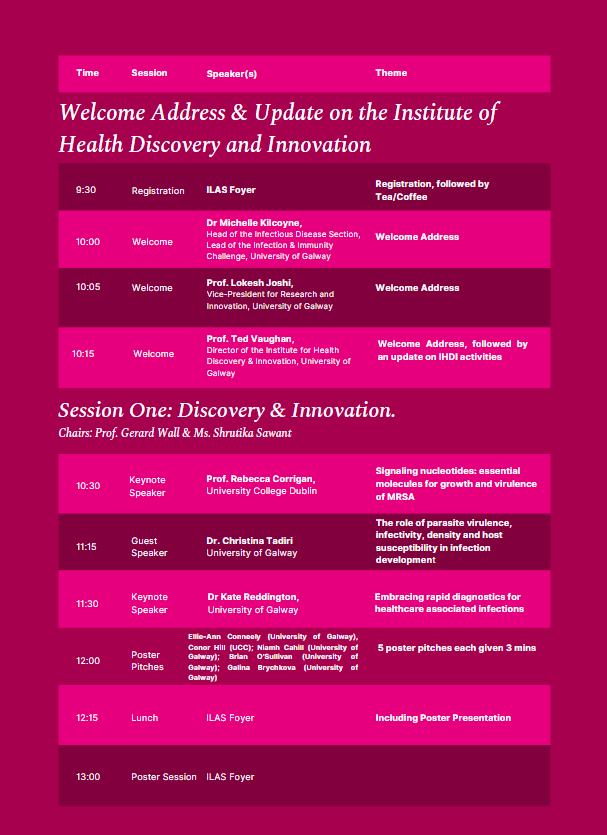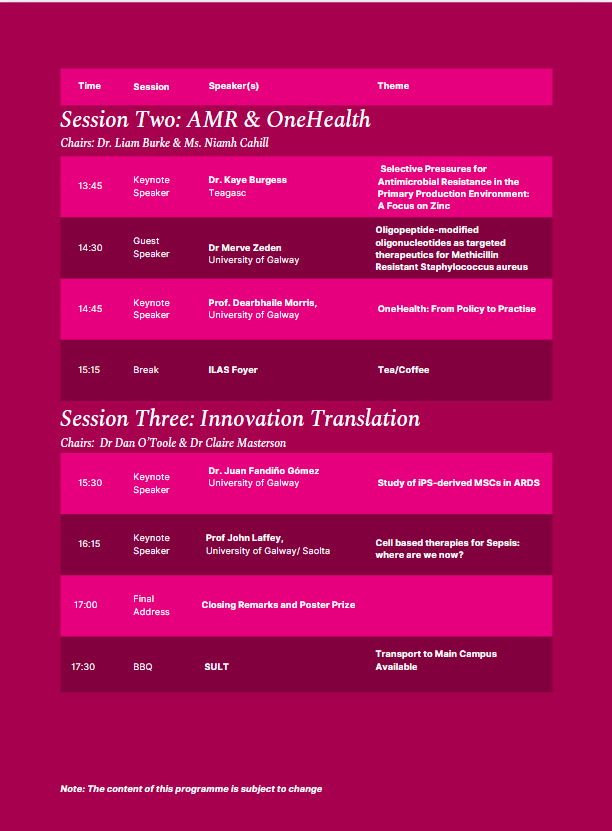Pathogen Biology Ireland Conference
6th June 2025

This year, the PBI conference has the pleasure of hosting the launch of the Infection and Immunity Cluster (IIC): from Discovery to Therapeutics, a thematic research cluster addressing a targeted health challenge within the Institute for Health and Discovery Innovation (IHDI) at the University of Galway. The IHDI's mission is to enhance both fundamental and applied understanding of diseases, while also facilitating the creation of innovative solutions for health. The IHDI is an interdisciplinary, cross-College Institute and covers a wide range of health research, including fundamental science, discovery, biomedical engineering, medical technologies, regenerative medicine, diagnostics, and advanced therapeutics. The IHDI will target impactful health-based research challenges to accelerate fundamental and applied understanding and enable disruptive solutions.
3rd Pathogen Biology Ireland Conference 6th June 2025
This is the 3rd year running the very successful Pathogen Biology Ireland conference (PBI) organised by the Infectious Disease Section (Department) at the University of Galway. The Section (Department) is multidisciplinary, and we wish to share and encourage interdisciplinary and multidisciplinary approaches to investigating pathogen biology and infectious disease research areas.
This year, the PBI conference has the pleasure of hosting the launch of the Infection and Immunity Cluster (IIC): from Discovery to Therapeutics, a thematic research cluster addressing a targeted health challenge within the Institute for Health and Discovery Innovation (IHDI) at the University of Galway. The IHDI's mission is to enhance both fundamental and applied understanding of diseases, while also facilitating the creation of innovative solutions for health. The IHDI is an interdisciplinary, cross-College Institute and covers a wide range of health research, including fundamental science, discovery, biomedical engineering, medical technologies, regenerative medicine, diagnostics, and advanced therapeutics. The IHDI will target impactful health-based research challenges to accelerate fundamental and applied understanding and enable disruptive solutions.
Themes
Solving the big questions of infection mechanisms, pathogenesis, immune response and modulation, and anti-microbial resistance, and translating these findings into new treatments and preventatives for infectious disease will take input and close collaborations from many different specialist fields including microbiologists, chemists, clinicians, mathematicians, epidemiologists, engineers, and many more. We hope that this conference launching the IIC will help to emphasise multi- and inter-disciplinary research, and facilitate researchers to new collaborators and applications in pathogen biology infectious diseases which may lead to valuable insights and strategies to solve outstanding problems in the highly related areas of infection and immunity.
Target Audience
This conference will help researchers share their research and meet collaborators with whom they can apply their work in novel ways to new problems and make a valuable impact. It also helps in networking and ideas for new funding applications.
Speaker Bios
Dr Rebecca Corrigan’s research involves the characterisation of nucleotide signalling systems in the Gram-positive pathogen Staphylococcus aureus. She established her lab in 2015 at the University of Sheffield where she received a Sir Henry Dale Wellcome Trust Fellowship and a Lister Institute Fellowship. More recently (2024) she secured a UCD Ad Astra Fellowship allowing her to move her lab back to Ireland.
Dr. Christina Tadiri is a Lecturer in Environmental Science at the University of Galway. Her work focuses on host-parasite interactions and dynamics in the context of environmental change. Dr. Tadiri was awarded a PhD in Biology in 2019 from McGill University in Montréal, where she studied how factors at different scales influenced Gyrodactylus dynamics in fish. In 2021, she was awarded a Marie Curie Postdoctoral Fellowship form the European Commission to move to the University of Basel in Switzerland, where she studied how various factors shaped Daphnia-Pasteuria interactions and seasonal dynamics. In September 2024 she started her own lab at the University of Galway
Dr Kaye Burgess is a Principal Research Officer in the Food Safety Department in Teagasc Food Research Centre Ashtown in Dublin. Kaye’s research group is focused is on understanding the behaviour and virulence of foodborne pathogens and antimicrobial resistant microorganisms in food production, using a One Health approach. She currently coordinates the Irish Dept of Agriculture funded HortAssure and DETCON projects and the EPA funded I-RACE project. She was also a funded investigator as part of the One Health European Joint Programme. Kaye has a PhD in molecular microbiology from University College Cork in Ireland.
Dr Kate Reddington is a Principal Investigator in the Infectious Disease section of the School of Biological and Chemical Sciences at University of Galway. Her research focuses on the development of innovative solutions for infectious disease diagnostics and public health microbiology. Kate has extensive experience in the development of diagnostics for a wide range of bacterial, fungal and viral pathogens. She has a strong track record in commercialisation and translational research throughout her career. Ultimately her group aims to develop infectious disease diagnostics which improve patient outcomes
Dr. Merve Zeden is a Cypriot scientist. She completed her BSc Microbiology, MRes in Bacterial Pathogenesis and Infection and pursued her PhD in the Gründling lab investigating the requirement of the signalling nucleotide c-di-AMP for the growth of Staphylococcus aureus at Imperial College London. Merve moved to Ireland in January 2020, for her postdoc in the O’Gara lab at University of Galway to integrate molecular microbiology with antimicrobial resistance (AMR) research. She is now a Research Ireland Pathway Fellow, and her research group is investigating the molecular mechanisms of AMR and developing targeted therapeutics for ESKAPE pathogens.
Prof Dearbháile Morris is Professor of Antimicrobial Resistance and One Health at the School of Medicine, Director of the Antimicrobial Resistance and Microbial Ecology Group and Director of the Ryan Institute Centre for One Health at the University of Galway. Dearbháile is a microbiologist with over 20 years’ experience of research into antimicrobial resistance, foodborne and waterborne pathogens, emerging contaminants, the wider societal impact of infection and One Health.
Dr Jerry Reen did a BSc in Biochemistry at the National University of Ireland Galway, subsequently pursuing a PhD in the Molecular GlycoBiotechnology Group at NUIG. His Postdoctoral journey included working with Dr. E. Fidelma Boyd in the School of Microbiology at University College Cork (UCC), with Prof. M. McClelland at the Sidney Kimmel Cancer Center, San Diego, USA, and with Prof. Fergal O’Gara in the BIOMERIT Research Centre at University College Cork. Jerry has been a member of faculty in the School of Microbiology at UCC since 2017, where his research interests are in deciphering the communication systems underpinning polymicrobial-host interactions for human and ecosystem health, as well as delivering green sustainable solutions for the (Bio)Pharma industry. The Reen lab was the first research lab in UCC to achieve Bronze LEAF status for sustainable and efficient research practices and has since been awarded the highest level of Green Certification through My Green Lab and Research Ireland.
Professor John Laffey is Professor of Anesthesia and Intensive Care Medicine at the University of Galway, Ireland. He is Director of Clinical Research Governance at University of Galway and the Ireland West-Northwest Region. He is research chair elect at the European Society of Intensive Care Medicine (ESICM). Recent prior roles include being Chair of the Irish Critical Care Trials Group, and he was the inaugural Chair of the Translational Biology Section at ESICM. His research is both translational and clinical and is focused on the critical illnesses of ARDS and sepsis.
Transport
Parking Permit
Parking is available in the Dangan park and ride car park. Directions to the carpark are available here . Please follow the link to register for your parking permit here. Please note that this permit applies to parking only in the staff car park in the WHITE-lined spaces.
Transport to Barbeque
A bus will depart from the ILAS at 5:30pm.
Wi-Fi
To access guest Wi-Fi for the event please follow this link here.
ILAS
Directions to the Institute for Lifecourse and Society (ILAS) are available here.






